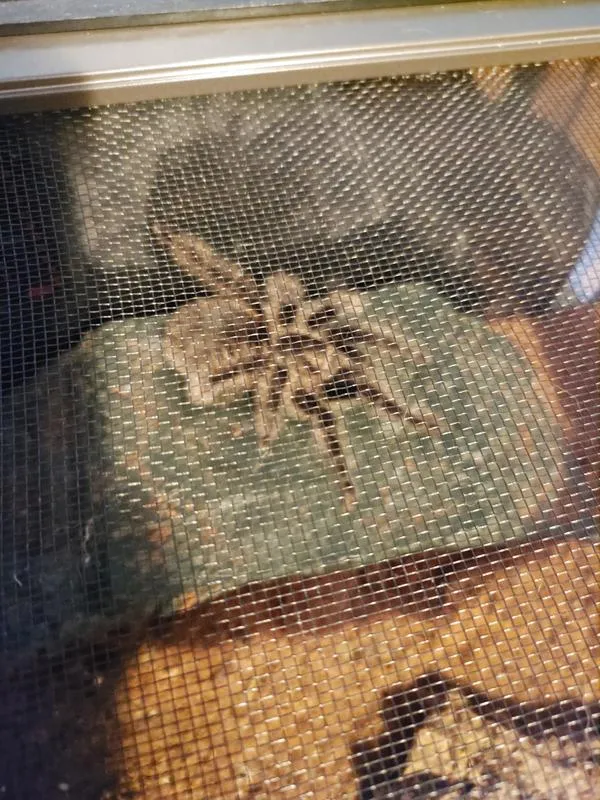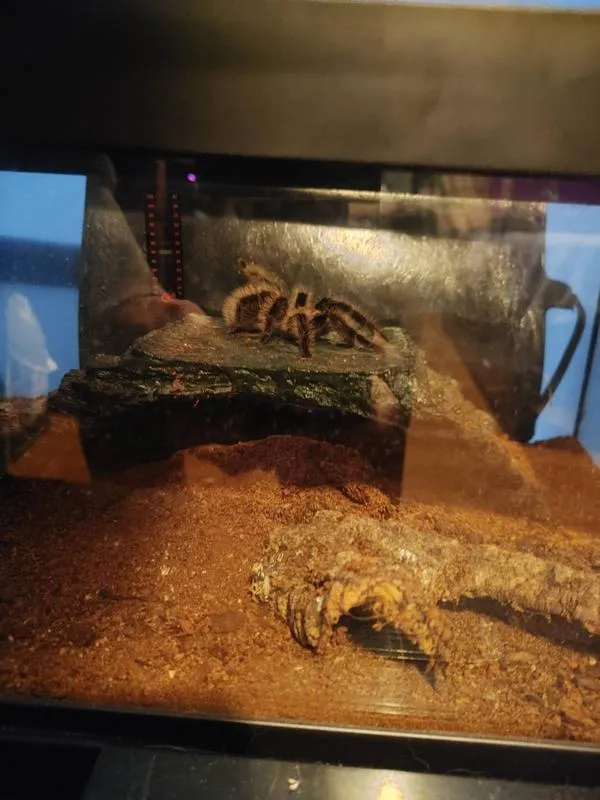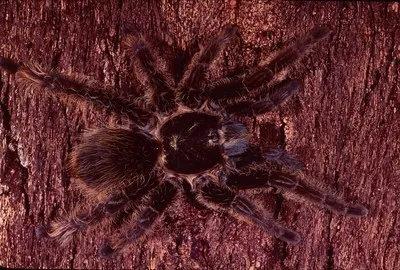What is a Rose Hair Tarantula?
The Rose Hair Tarantula (Grammostola rosea), also known as the Chilean Rose Tarantula, is a popular pet tarantula, particularly among beginners. Native to the arid regions of Chile, Bolivia, and Argentina, these spiders are known for their docile temperament and relatively low maintenance requirements. Their popularity stems from their gentle nature, attractive appearance, and manageable size. Owning a Rose Hair Tarantula offers a fascinating opportunity to observe the unique behaviors of arachnids and provides a rewarding experience for pet owners. They are also recognized for their longevity, often living for several years, making them a long-term companion for any pet owner. When considering getting a Rose Hair Tarantula it’s important to do your research and find a reputable seller like Petco to ensure the health of your new pet.
Appearance of a Rose Hair Tarantula
Rose Hair Tarantulas are recognized by their distinctive appearance, which has significantly contributed to their popularity as pets. They typically exhibit a dark brown to black coloration, often with reddish hairs that give them their name. The coloration can vary depending on the individual spider and their stage of molting. They possess a robust, hairy body with a cephalothorax (fused head and chest) and an abdomen. Their leg span can reach up to 5-6 inches, making them a medium-sized tarantula. The females are generally larger than the males, and their overall appearance is quite striking. They also have spinnerets, which are used to produce silk for creating webs and lining their burrows. The striking appearance is a key factor in the appeal of the Rose Hair Tarantula to pet owners. Furthermore, their sturdy build suggests they are fairly hardy.
Habitat and Care Requirements of a Rose Hair Tarantula

Creating an appropriate habitat is essential for the health and well-being of your Rose Hair Tarantula. The enclosure should be appropriately sized, allowing the tarantula to move around comfortably. A ten-gallon tank is usually sufficient for an adult. The enclosure should be well-ventilated with a secure lid to prevent escape. Maintaining the correct environmental conditions is crucial for their health and molting process. The substrate should be at least 2-4 inches deep, and you can use substrates such as peat moss, coconut fiber, or a mixture of both. Provide a hide, like a piece of cork bark or a half-log, for the tarantula to feel secure. It is also important to provide a shallow water dish and ensure the water is clean and readily available. Regular cleaning and maintenance of the habitat is another key factor, as this will help prevent disease and infection. Ensure the habitat does not have any decorations that could potentially harm the spider.
Temperature and Humidity
Rose Hair Tarantulas thrive in specific temperature and humidity conditions. The ideal temperature range for them is between 75-85°F (24-29°C). You can use a heat lamp or a heat pad to maintain this temperature, ensuring it doesn’t directly touch the enclosure, to prevent overheating. Maintaining appropriate humidity is just as crucial. While they come from arid environments, they still need some humidity for successful molting. Keep the humidity level between 60-70%. You can achieve this by lightly misting the enclosure with water once or twice a week, depending on your climate and the ventilation of the enclosure. Monitoring the temperature and humidity levels with a reliable thermometer and hygrometer is also necessary. Failure to provide these conditions can lead to health problems for your Rose Hair Tarantula. By carefully providing these needs, you’re more likely to have a thriving pet.
Substrate and Enclosure
The right substrate and enclosure setup will contribute to the well-being of your Rose Hair Tarantula, as they will have a place to hide and regulate their environment. The enclosure itself should be appropriately sized; a 10-gallon tank is usually suitable for an adult Rose Hair Tarantula. It’s crucial that the enclosure has a secure lid to prevent escape. For the substrate, use a mixture of peat moss, coconut fiber, and/or vermiculite to hold moisture and allow the tarantula to burrow. The substrate should be at least 2-4 inches deep. Provide the tarantula with a hide, such as a piece of cork bark or a half-log, to provide a sense of security and retreat. Ensure the enclosure also has adequate ventilation to prevent mold and fungal growth. Regularly check and replace the substrate as needed, keeping the environment clean and maintaining optimal conditions.
Feeding Your Rose Hair Tarantula

Feeding is a significant part of Rose Hair Tarantula care, and they generally have simple requirements. The tarantula’s diet should consist primarily of insects. Crickets, mealworms, and dubia roaches are some commonly used food sources. Feeding frequency depends on the spider’s age; juveniles should be fed more often than adults. Typically, feed juveniles every other day, while adults can be fed once or twice a week. It is important to ensure the insects are appropriately sized, no larger than the spider’s body. Remove any uneaten food within 24 hours to prevent the buildup of mold and bacteria. Always ensure that the water dish is clean and accessible at all times. Supplement the diet with calcium and vitamins, if necessary, to ensure optimal health, especially during molting. This will contribute to the overall health and happiness of your tarantula.
How Much Does a Rose Hair Tarantula Cost at Petco?
The price of a Rose Hair Tarantula at Petco, or any other pet store, can vary based on several factors. However, generally, they are known to be one of the more affordable tarantula species available. Petco generally sells juvenile Rose Hair Tarantulas, and the cost can range from $20 to $50. Prices may differ based on the size, coloration, and overall health of the tarantula. Petco may also have sales or promotions that affect the pricing. It is recommended that you contact your local Petco store or visit their website to check their current prices. Purchasing a Rose Hair Tarantula is an investment, so compare the price to the care and maintenance costs for your new pet. This price range makes the Rose Hair Tarantula accessible for those who are new to owning tarantulas and want a less expensive pet.
Factors Influencing the Price
Several factors can influence the price of a Rose Hair Tarantula. One of the key elements is the size of the tarantula; juveniles are generally less expensive than adults. The coloration and overall health of the tarantula also impact the price. Tarantulas with brighter or more unique colors might cost more. The breeder or the source from which Petco obtains the tarantulas can also influence the price; those from reputable breeders are often sold at a premium. Location can also play a role. Prices may vary based on the demand and supply in different regions. Sales and promotions offered by Petco can temporarily lower the price. Furthermore, any accompanying items, such as the enclosure or accessories, will affect the total cost. Considering all these aspects will give you a comprehensive understanding of the factors influencing the price of a Rose Hair Tarantula.
Comparing Prices at Petco vs. Other Pet Stores

When shopping for a Rose Hair Tarantula, comparing prices at Petco versus other pet stores is advisable. Petco, being a large chain, often offers competitive pricing due to its purchasing power and frequent promotions. Local pet stores may have slightly different prices, influenced by their operating costs and specific suppliers. Local breeders are another potential option, and they may offer Rose Hair Tarantulas at a slightly higher price, reflecting their specialized knowledge and care. When making your comparison, also consider the quality and health of the tarantula. Ask about the tarantula’s age, feeding habits, and any health records from the store or breeder. Additionally, look at the customer service and return policies; these can vary from store to store. The best deal balances price, health, and customer support to ensure you have a positive experience. Before purchasing your tarantula, visit the location to ensure the cleanliness of their tanks and general health of the spiders.
Where to Buy a Rose Hair Tarantula
You can purchase a Rose Hair Tarantula from several different locations. Petco is a common choice, with the convenience of multiple locations and readily available stock. Local pet stores offer another option, and they often provide personalized service and care guidance. Reputable breeders are a great choice. They usually specialize in tarantulas and can provide detailed information about the spider’s origins and care. Online retailers and specialized tarantula shops also offer a variety of options, but always check the seller’s reputation and reviews before purchasing. When selecting a seller, check for healthy-looking tarantulas and a clean environment. Always research the seller’s care practices and return policies. It is advisable to select a seller who prioritizes the welfare of the animals. This will increase the likelihood of getting a healthy tarantula. Consider your needs and preferences when deciding where to purchase your Rose Hair Tarantula, as the most important factor should be the health of the tarantula.
Health and Lifespan of Rose Hair Tarantulas
Understanding the health and lifespan of a Rose Hair Tarantula is crucial for providing proper care. These tarantulas are known for their longevity, with females often living for 15-20 years or longer, while males typically live for 5-10 years. Providing proper care is vital for their overall health. They require regular feeding, proper temperature and humidity, and a clean habitat. Signs of a healthy tarantula include an active and responsive behavior, a good appetite, and a well-maintained exoskeleton. Be on the lookout for any signs of illness, such as lethargy, loss of appetite, or difficulties with molting. If you notice these signs, consult with a veterinarian or a tarantula expert. Regularly handling the tarantula is not necessary and can sometimes be harmful. It is important to handle them carefully, if at all. By providing proper care and recognizing potential health issues, you can help your Rose Hair Tarantula live a long, healthy, and fulfilling life. In general, Rose Hair Tarantulas are pretty hardy pets.
